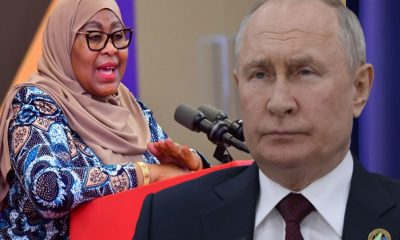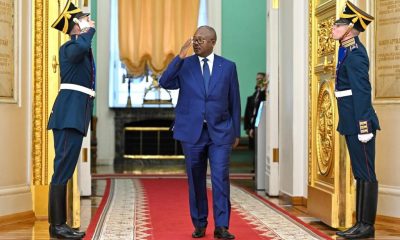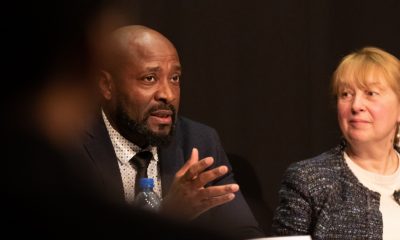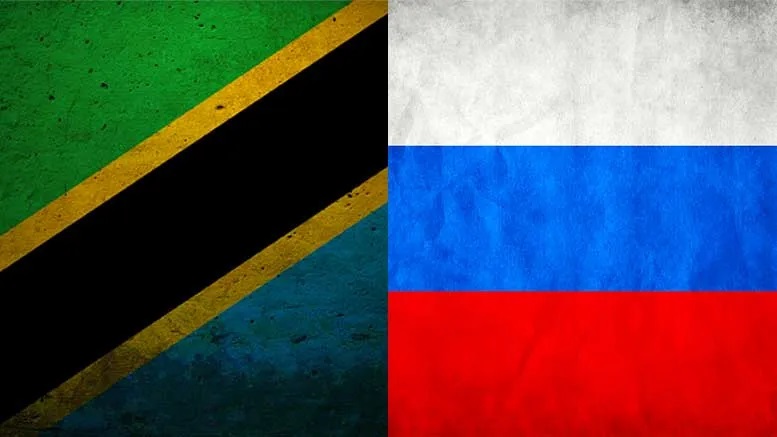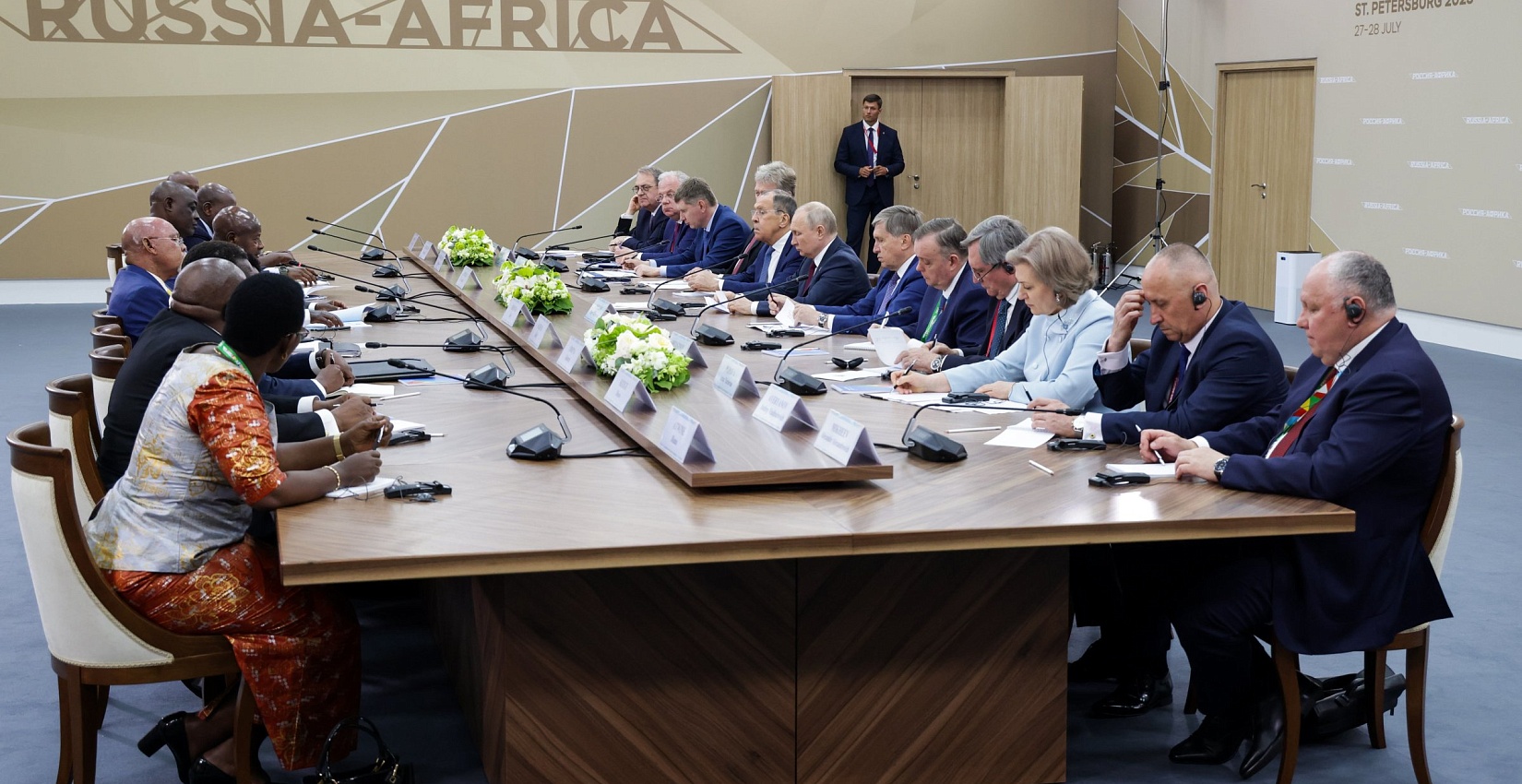World
Time to Clarify What African Leaders Want from Russia
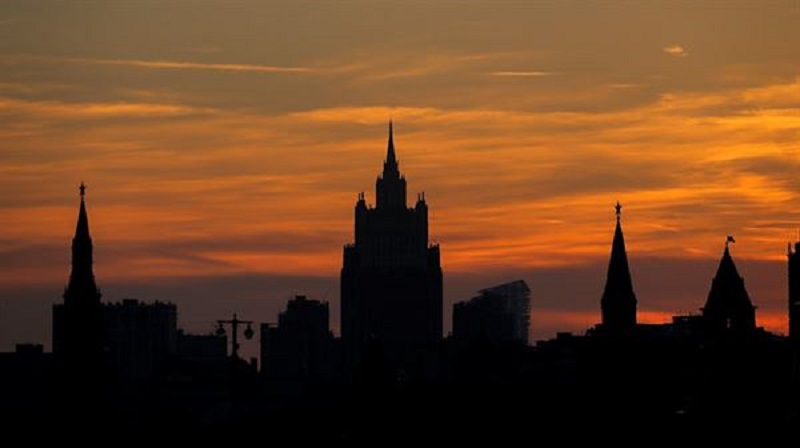
By Kestér Kenn Klomegâh
From various interpretations, Russia is taking advantage of the past Soviet-era connections, Africa’s growing dissatisfaction and disappointment with the Western world, but its economic influence remains marginal compared to other key foreign players. Despite the fact that Western and European are experiencing falling influence, they are still far ahead of Russia, especially considering its global status. China is the main player in the continent.
Russia has sought to convince African leaders, the elites and the middle class over the past years of the likely dangers of neocolonial tendencies perpetrated by the former colonial masters and the scramble for resources on the continent. Obviously, Russia has taken the most difficult task, reminiscent of the Cold War, particularly in the 1980s when the East-West confrontation reached its heights, leading finally to the collapse of the Soviets in 1991.
Some international and African experts and even political leaders seriously argue that the best way to fight neocolonialism is to invest in order to jostle for economic influence. Russia has highly criticized foreign players, including the United States and European Union members. On the other side, Moscow believes that it is open to cooperation with everyone for mutual benefit, while it seemingly deepens differences there, which threatens African unity.
In practical terms, Russia’s policy largely has numerous setbacks and potholes, but officials have now begun acknowledging them step by step. The most common attitude is too loud noise on its dream, characterized by anti-Western confrontations, of return to Africa. Results from policy initiatives are relatively little, invisible across Africa. Russia’s approach brings only a few concrete results relating to badly needed economic development and its African partners.
Nevertheless, in trying to understand whether Russia is a developing development-oriented policy towards Africa, it is simply necessary to list development projects that it has undertaken and completed since the Soviet collapse. Russia hoped to be part of Europe and develop trade from Lisbon to Vladivostok, which has been the popular post-Soviet dream. It has even been reflected in foreign travels within the spectrum of its population. Moscow today is still not a popular destination for Africa’s 380 million middle class.
The first such summit was held in Sochi in October 2019 under the motto “For Peace, Security and Development,” which attracted a large number of African representatives. As Russia prepares to strengthen its overall corporate economic profile during the next African leaders’ summit in July 2023, many Russian policy experts are questioning bilateral agreements that were signed, many of them largely remained unimplemented, with various African countries.
At the prestigious Moscow-based Institute for African Studies, well-experienced policy researchers such as Professors Vladimir Shubin and Alexandra Arkhangelskaya have argued that Russia needs to be more strategic in aligning its interests and be more proactive with instruments and mechanisms in promoting economic cooperation in order to reap the benefits of a fully-fledged partnership.
“The most significant positive sign is that Russia has moved away from its low-key strategy to vigorous relations, and authorities are seriously showing readiness to compete with other foreign players. But, Russia needs to find a strategy that really reflects the practical interests of Russian business and African development needs,” said Arkhangelskaya, who is also a Senior Lecturer at the Moscow High School of Economics.
Currently, the signs for Russia-African relations are impressive – declarations of intentions have been made, and a lot of important bilateral agreements have been signed – now, it remains to be seen how these intentions and agreements entered into these years will be implemented in practice, she pointed out in an interview.
The revival of Russia-African relations has to be enhanced in all fields. Obstacles to the broadening of Russia-African relations have to be addressed more vigorously. These include, in particular, the lack of knowledge or information in Russia about the situation in Africa and vice versa, suggested Arkhangelskaya.
It plans to hold the next African leaders’ summit in July, despite the fact that it has not implemented already signed 92 bilateral agreements and largely not delivered on its words concerning engagement in various economic sectors in African countries. There have been several development-oriented initiatives over these years without tangible results. Over the years, attempts have been made to understand Russia’s financial capabilities and inconsistent approach to implementing bilateral policy projects in Africa.
As expected, these weaknesses were compiled and incorporated in the Situation Analytical Report by 25 policy researchers headed by Professor Sergey Karaganov, Faculty Dean at Moscow’s High School of Economics. This 150-page report was presented in November 2021, which offers new directions and recommendations for improving policy methods and approaches with Africa.
Another policy report titled ‘Ways to Increase the Efficiency of Russia’s African Strategy under the Crisis of the Existing World Order’ co-authored by Professors Irina O. Abramova and Leonid L. Fituni, castigated or reprimanded authorities who are squeezed between illusions and realities with policy ambitions in Africa. Against the backdrop of geopolitical changes and great power competition, Russian authorities really need to have an insight understanding into the practical investment and economic possibilities in the continent.
The authors said that “it is time for Russia, which over the past 30 years has unsuccessfully sought to become part of the West, to abandon illusions and reconsider its foreign economic and foreign policy strategy, reorienting itself to states that are turning from outsiders into significant players in the international political and economic space and are willing to interact with our country on a mutually beneficial and equal basis.“
In addition, the report underlined the fact that the Russian elite demonstrates a somewhat arrogant attitude towards Africa. High-ranking officials have often used the phrase ‘We (that is, Russia) are not Africa’ to oppose attempts to change the status quo to change the approach towards Africa. Despite the thoughtless imposition of the idea of Africa as the most backward and problematic region of the world in Russian public opinion, qualified Africanists, including Western experts, call Africa the continent of the 21st century, attributing this to the stable growth rates of the African economy over the past 20 years and the colossal resource and human potential of the African region.
The report acknowledges the fact that African countries consider Russia as a reliable economic partner, and it is necessary to interact with African public and private businesses on a mutually beneficial basis. In this regard, Russian initiatives should support by real steps and not be limited to verbal declarations about the “return of Russia to Africa,” especially after the Sochi gathering, which was described as very symbolic.
The authors, however, warned that due to the failure of the Russian side to show financial commitment, African leaders and the elites from the Anglophone, Francophone and Lusophone will still be loyal and inseparably linked by nostalgic post-colonial master relationship. And relates to the furtherance of economic investment and development, education and training – all to be controlled by the former colonial powers, as African leaders choose development partners with funds to invest in the economy.
In the wake of changing conditions and challenges in Africa, foreign partners are constantly reviewing their economic prospects and robustly investing in order to tackle long-term sustainable development goals, while African countries are making their choices based on their development needs. The result is that observers and opinion-makers struggle to understand the nitty-gritty of who is playing at what, where and how.
Foreign Minister Sergey Lavrov has severally reminded that the African direction is one of Russia’s priorities and further praised Africa for its contribution to the development of a fairer and more democratic polycentric (multipolar) world order and to the settlement of current problems. “Russia actively contributed to the independence of African countries and the development and strengthening of their states. Today, we maintain friendly relations that are spearheaded into the future,” he noted.
On taking partnership with Africa to a new level, he unreservedly said: “African countries play a prominent role in international affairs and take an active position in solving topical issues of modern world politics and economics. Progress in the economic and social spheres, improving the quality of life on the African continent contributes to this.”
In his view, “this new stage and this new quality of relations should be based on common values, support for values of justice, equality and respect for the rights of nations to independently choose their future. It is within this framework that Russia continues to coordinate positions at international platforms and makes joint efforts in the interests of stability on the African continent.
Unlike Western countries, European Union members and Asian countries, which focus particularly on what they want to achieve with Africa, Russia places anti-colonial fight at the core of its policy. In short, Russia knows what it wants from the continent: access to markets, political support and general influence. Now it is time for African leaders to clarify what it wants from Russia in return in the lead-up to the July 2023 Russia-Africa summit.
Russia-African relations are based on long-standing traditions of friendship and solidarity created when the Soviet Union supported the struggle of the peoples of Africa against colonialism, racism, and apartheid, protected their independence and sovereignty, and helped establish statehood, and built the foundations of the national economy, according to historical archival documents.
World
African Visual Art is Distinguished by Colour Expression, Dynamic Form—Kalalb

By Kestér Kenn Klomegâh
In this insightful interview, Natali Kalalb, founder of NAtali KAlalb Art Gallery, discusses her practical experiences of handling Africa’s contemporary arts, her professional journey into the creative industry and entrepreneurship, and also strategies of building cultural partnership as a foundation for Russian-African bilateral relations. Here are the interview excerpts:
Given your experience working with Africa, particularly in promoting contemporary art, how would you assess its impact on Russian-African relations?
Interestingly, my professional journey in Africa began with the work “Afroprima.” It depicted a dark-skinned ballerina, combining African dance and the Russian academic ballet tradition. This painting became a symbol of cultural synthesis—not opposition, but dialogue.
Contemporary African art is rapidly strengthening its place in the world. By 2017, the market was growing so rapidly that Sotheby launched its first separate African auction, bringing together 100 lots from 60 artists from 14 foreign countries, including Algeria, Ghana, Mali, Nigeria, Senegal, and others. That same year during the Autumn season, Louis Vuitton Foundation in Paris hosted a major exhibition dedicated to African art. According to Artnet, sales of contemporary African artists reached $40 million by 2021, a 434% increase in just two years. Today, Sotheby holds African auctions twice a year, and in October 2023, they raised $2.8 million.
In Russia, this process manifests itself through cultural dialogue: exhibitions, studios, and educational initiatives create a space of trust and mutual respect, shaping the understanding of contemporary African art at the local level.
Do you think geopolitical changes are affecting your professional work? What prompted you to create an African art studio?
The international context certainly influences cultural processes. However, my decision to work with African themes was not situational. I was drawn to the expressiveness of African visual language—colour, rhythm, and plastic energy. This theme is practically not represented systematically and professionally in the Russian art scene.
The creation of the studio was a step toward establishing a sustainable platform for cultural exchange and artistic dialogue, where the works of African artists are perceived as a full-fledged part of the global cultural process, rather than an exotic one.
To what extent does African art influence Russian perceptions?
Contemporary African art is gradually changing the perception of the continent. While previously viewed superficially or stereotypically, today viewers are confronted with the depth of artistic expression and the intellectual and aesthetic level of contemporary artists.
Portraits are particularly impactful: they allow us to see not just an abstract image of a “continent,” but a concrete personality, character, and inner dignity. Global market growth data and regular auctions create additional trust in African contemporary art and contribute to its perception as a mature and valuable movement.
Does African art reflect lifestyle and fashion? How does it differ from Russian art?
African art, in my opinion, is at its peak in everyday culture—textiles, ornamentation, bodily movement, rhythm. It interacts organically with fashion, music, interior design, and the urban environment. The Russian artistic tradition is historically more academic and philosophical. African visual art is distinguished by greater colour expression and dynamic form. Nevertheless, both cultures are united by a profound symbolic and spiritual component.
What feedback do you receive on social media?
Audience reactions are generally constructive and engaging. Viewers ask questions about cultural codes, symbolism, and the choice of subjects. The digital environment allows for a diversity of opinions, but a conscious interest and a willingness to engage in cultural dialogue are emerging.
What are the key challenges and achievements of recent years?
Key challenges:
- Limited expert base on African contemporary art in Russia;
- Need for systematic educational outreach;
- Overcoming the perception of African art as exclusively decorative or ethnic.
Key achievements:
- Building a sustainable audience;
- Implementing exhibition and studio projects;
- Strengthening professional cultural interaction and trust in African
contemporary art as a serious artistic movement.
What are your future prospects in the context of cultural diplomacy?
Looking forward, I see the development of joint exhibitions, educational programs, and creative residencies. Cultural diplomacy is a long-term process based on respect and professionalism. If an artistic image is capable of uniting different cultural traditions in a single visual space, it becomes a tool for mutual understanding.
World
Ukraine Reveals Identities of Nigerians Killed Fighting for Russia

By Adedapo Adesanya
The Ukrainian Defence Intelligence (UDI) has identified two Nigerian men, Mr Hamzat Kazeem Kolawole and Mr Mbah Stephen Udoka, allegedly killed while fighting as Russian mercenaries in the war between the two countries ongoing since February 2022.
The development comes after Russia denied knowledge of Nigerians being recruited to fight on the frontlines.
Earlier this week, the Russian Ambassador to Nigeria, Mr Andrey Podyolyshev, said in Abuja that he was not aware of any government-backed programme to recruit Nigerians to fight in the war in Ukraine.
He said if at all such activity existed, it is not connected with the Russian state.
However, in a statement on Thursday, the Ukrainian Defence released photographs of Nigerians killed while defending Russia.
“In the Luhansk region, military intelligence operatives discovered the bodies of two citizens of the Federal Republic of Nigeria — Hamzat Kazeen Kolawole (03.04.1983) and Mbah Stephen Udoka (07.01.1988),” the statement read.
According to the statement, both men served in the 423rd Guards Motor Rifle Regiment (military unit 91701) of the 4th Guards Kantemirovskaya Tank Division of the armed forces of the Russian Federation.
UDI said that they signed contracts with the Russian Army in the second half of 2025 – the deceased Mr Kolawole on August 29 and Mr Udoka on September 28.
“Udoka received no training whatsoever — just five days later, on October 3, he was assigned to the unit and sent to the temporarily occupied territories of Ukraine,” the report read.
It added that no training records for Mr Kolawole have been preserved; however, it is highly likely that he also received no military training, but his wife and three children remain in Nigeria.
Both Nigerians, the report added, were killed in late November during an attempt to storm Ukrainian positions in the Luhansk region.
“They never engaged in a firefight — the mercenaries were eliminated by a drone strike,” UDI stated, warning foreign citizens against travelling to the Russian Federation or taking up any work on the territory of the “aggressor state”.
“A trip to Russia is a real risk of being forced into a suicide assault unit and, ultimately, rotting in Ukrainian soil,” the statement read.
In an investigation earlier this month, CNN reported that hundreds of African men have been enticed to fight for Russia in Ukraine with the promise of civilian jobs and high salaries. However, the media organisation uncovered that they are being deceived or sent to the front lines with little combat training.
CNN said it reviewed hundreds of chats on messaging apps, military contracts, visas, flights and hotel bookings, as well as gathering first-hand accounts from African fighters in Ukraine, to understand just how Russia entices African men to bolster its ranks.
World
Today’s Generation of Entrepreneurs Value Flexibility, Autonomy—McNeal-Weary

By Kestér Kenn Klomegâh
The Young African Leaders Initiative (YALI) is the United States’ signature step to invest in the next generation of African leaders. Since its establishment in 2010 by Obama administration, YALI has offered diverse opportunities, including academic training in leadership, governance skills, organizational development and entrepreneurship, and has connected with thousands of young leaders across Africa. This United States’ policy collaboration benefits both America and Africa by creating stronger partnerships, enhancing mutual prosperity, and ensuring a more stable environment.
In our conversation, Tonya McNeal-Weary, Managing Director at IBS Global Consulting, Inc., Global Headquarters in Detroit, Michigan, has endeavored to discuss, thoroughly, today’s generation of entrepreneurs and also building partnerships as a foundation for driving positive change and innovation in the global marketplace. Here are the excerpts of her conversation:
How would you describe today’s generation of entrepreneurs?
I would describe today’s generation of entrepreneurs as having a digital-first mindset and a fundamental belief that business success and social impact can coexist. Unlike the entrepreneurs before them, they’ve grown up with the internet as a given, enabling them to build global businesses from their laptops and think beyond geographic constraints from day one. They value flexibility and autonomy, often rejecting traditional corporate ladders in favor of building something meaningful on their own terms, even if it means embracing uncertainty and financial risk that previous generations might have avoided.
And those representing the Young African Leaders Initiative, who attended your webinar presentation late January 2026?
The entrepreneurs representing the Young African Leaders Initiative are redefining entrepreneurship on the continent by leveraging their unique perspectives, cultural heritage, and experiences. Their ability to innovate within local contexts while connecting to global opportunities exemplifies how the new wave of entrepreneurs is not confined by geography or conventional expectations.
What were the main issues that formed your ‘lecture’ with them, Young African Leaders Initiative?
The main issues that formed my lecture for the Young African Leaders Initiative were driven by understanding the importance of building successful partnerships when expanding into the United States or any foreign market. During my lecture, I emphasized that forming strategic alliances can help entrepreneurs navigate unfamiliar business environments, access new resources, and foster long-term growth. By understanding how to establish strong and effective partnerships, emerging leaders can position their businesses for sustainable success in global markets. I also discussed the critical factors that contribute to successful partnerships, such as establishing clear communication channels, aligning on shared goals, and cultivating trust between all parties involved. Entrepreneurs must be proactive in seeking out partners who complement their strengths and fill gaps in expertise or resources. It is equally important to conduct thorough due diligence to ensure that potential collaborators share similar values and ethical standards. Ultimately, the seminar aimed to empower YALI entrepreneurs with practical insights and actionable strategies for forging meaningful connections across borders. Building successful partnerships is not only a pathway to business growth but also a foundation for driving positive change and innovation in the global marketplace.
What makes a ‘leader’ today, particularly, in the context of the emerging global business architecture?
In my opinion, a leader in today’s emerging global business architecture must navigate complexity and ambiguity with a fundamentally different skill set than what was previously required. Where traditional leadership emphasized command-and-control and singular vision, contemporary leaders succeed through adaptive thinking and collaborative influence across decentralized networks. Furthermore, emotional intelligence has evolved from a soft skill to a strategic imperative. Today, the effective modern leader must possess deep cross-cultural intelligence, understanding that global business is no longer about exporting one model worldwide but about genuinely integrating diverse perspectives and adapting to local contexts while maintaining coherent values.
Does multinational culture play in its (leadership) formation?
I believe multinational culture plays a profound and arguably essential role in forming the kind of leadership required in today’s global business environment. Leaders who have lived, worked, or deeply engaged across multiple cultural contexts develop a cognitive flexibility that’s difficult to replicate through reading or training alone. More importantly, multinational exposure tends to dismantle the unconscious certainty that one’s own way of doing things is inherently “normal” or “best.” Leaders shaped in multicultural environments often develop a productive discomfort with absolutes; they become more adept at asking questions, seeking input, and recognizing blind spots. This humility and curiosity become strategic assets when building global teams, entering new markets, or navigating geopolitical complexity. However, it’s worth noting that multinational experience alone doesn’t automatically create great leaders. What matters is the depth and quality of cross-cultural engagement, not just the passport stamps. The formation of global leadership is less about where someone has been and more about whether they’ve developed the capacity to see beyond their own cultural lens and genuinely value differences as a source of insight rather than merely tolerating them as an obstacle to overcome.
In the context of heightening geopolitical situation, and with Africa, what would you say, in terms of, people-to-people interaction?
People-to-people interaction is critically important in the African business context, particularly as geopolitical competition intensifies on the continent. In this crowded and often transactional landscape, the depth and authenticity of human relationships can determine whether a business venture succeeds or fails. I spoke on this during my presentation. When business leaders take the time for face-to-face meetings, invest in understanding local priorities rather than imposing external agendas, and build relationships beyond the immediate transaction, they signal a different kind of partnership. The heightened geopolitical situation actually makes this human dimension more vital, not less. As competition increases and narratives clash about whose model of development is best, the businesses and nations that succeed in Africa will likely be those that invest in relationships characterized by reciprocity, respect, and long-term commitment rather than those pursuing quick wins.
How important is it for creating public perception and approach to today’s business?
Interaction between individuals is crucial for shaping public perception, as it influences views in ways that formal communications cannot. We live in a society where word-of-mouth, community networks, and social trust areincredibly important. As a result, a business leader’s behavior in personal interactions, their respect for local customs, their willingness to listen, and their follow-through on commitments have a far-reaching impact that extends well beyond the immediate meeting. The geopolitical dimension amplifies this importance because African nations now have choices. They’re no longer dependent on any single partner and can compare approaches to business.
From the above discussions, how would you describe global business in relation to Africa? Is it directed at creating diverse import dependency?
While it would be too simplistic to say global business is uniformly directed at creating import dependency, the structural patterns that have emerged often produce exactly that outcome, whether by design or as a consequence of how global capital seeks returns. Global financial institutions and trade agreements have historically encouraged African nations to focus on their “comparative advantages” in primary commodities rather than industrial development. The critical question is whether global business can engage with Africa in ways that build productive capacity, transfer technology, develop local talent, and enable countries to manufacture for themselves and for export—or whether the economic incentives and power irregularities make this structurally unlikely without deliberate policy intervention.
-

 Feature/OPED6 years ago
Feature/OPED6 years agoDavos was Different this year
-
Travel/Tourism10 years ago
Lagos Seals Western Lodge Hotel In Ikorodu
-

 Showbiz3 years ago
Showbiz3 years agoEstranged Lover Releases Videos of Empress Njamah Bathing
-

 Banking8 years ago
Banking8 years agoSort Codes of GTBank Branches in Nigeria
-

 Economy3 years ago
Economy3 years agoSubsidy Removal: CNG at N130 Per Litre Cheaper Than Petrol—IPMAN
-

 Banking3 years ago
Banking3 years agoSort Codes of UBA Branches in Nigeria
-

 Banking3 years ago
Banking3 years agoFirst Bank Announces Planned Downtime
-

 Sports3 years ago
Sports3 years agoHighest Paid Nigerian Footballer – How Much Do Nigerian Footballers Earn


